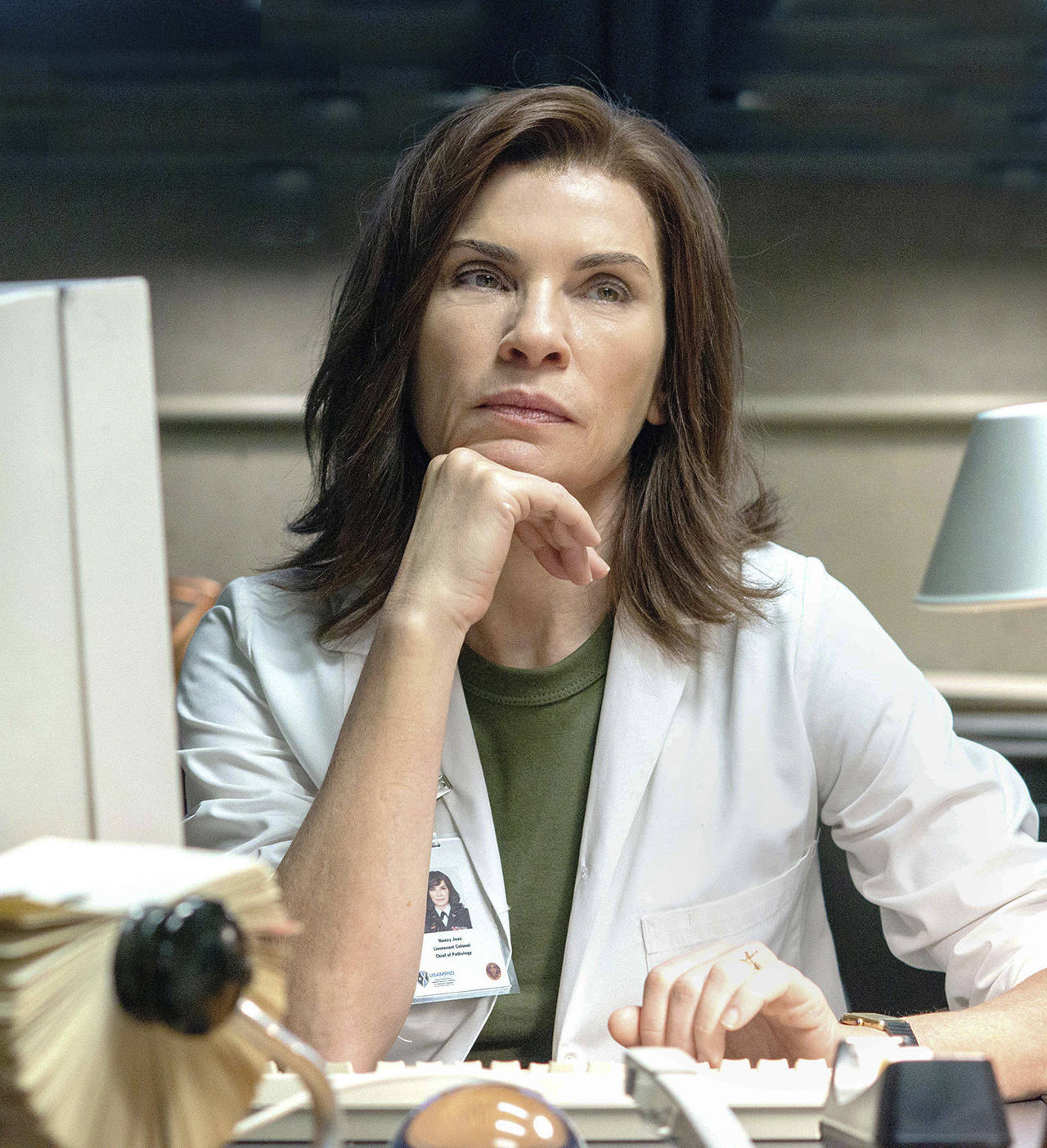PASADENA, Calif. — It may seem unusual, but actress Julianna Margulies’ latest role has changed her hygiene habits.
All those years as head nurse Carol Hathaway on “ER” didn’t faze her. But playing real-life Army pathologist Nancy Jaax in National Geographic’s “The Hot Zone” did.
“I definitely wash my hands more, and am very aware of what I’m touching, where things might have been. I now carry wipes in my bag. I never used to do that,” she says.
“The Hot Zone” is based on Richard Preston’s international best-selling book about the near-catastrophic arrival of the deadly Ebola virus on U.S. shores in 1989. When the silent killer was suddenly discovered in monkeys in a lab 20 miles from Washington, D.C., Jaax risked her life to prevent the spread of the disease to humans.
“It’s also not just the hand-washing,” adds Margulies. “I worked with Nancy Jaax’s real-life nephew, who is … an infectious disease specialist, one of the top in the field. And he told me that infectious disease specialists never touch their face.
“He said, ‘Now that you know that, you’re gonna watch people and you’re gonna see how many times in five minutes they will touch their face.’ And he said he never gets the flu or sick — maybe once every six years — because he’s not constantly touching his face. So, now I’m always sitting on my hands,” she laughs.
Liam Cunningham (“Game of Thrones”), who portrays a reclusive Ebola expert in “The Hot Zone,” says the show has affected him too.
“On a plane, I used to completely ignore coughing,” he shrugs. “I don’t ignore coughing anymore. I try to count the seats, how far this cough is away. And public transports, people sweating on public transport, concerns me now.”
Paul James (“The Path”), who plays an eager lab technician, reports he’s altered his routines. “I wash hands after the bathroom and regular times, but I definitely wash my hands before every meal,” he says. “I find myself doing it a lot more. I notice, on the subway in New York, people coughing a lot more than I used to.”
Margulies met with the real Col. Jaax, who is the chief pathologist of the U.S. Army Medical Institute of Infectious Diseases, and was impressed by her humility. “The thing that struck me about her personally was that she just doesn’t see herself as anything but a woman going to work,” says Margulies.
“I looked at her character as a hero, because she really emphasized what a threat this was and got the ball rolling to stop it from spreading. But to her, it was just another day at the office, really.
“I mean there’s moments, of course, when she has a tear in her suit where, once she’s in the decontamination chamber, she’s thinking of her children and her husband and her life and how that can all be compromised if she’s infected. But ultimately, it was amazing to play a woman who gets excited about going into a Level 4 biohazard lab, and dissecting tissue that may carry contagious agents that could kill you.”
Kelly Souders and Brian Peterson are show runners for the limited series, which premieres Memorial Day and airs three consecutive nights.
According to Souders, the nation came within a hair’s breadth of suffering a cataclysmic outbreak in ’89. “We were about one scary turn in the virus away. I mean, it was set up to be the biggest catastrophe in the United States,” she says. “Had things not broken slightly here and there, it would’ve been a disaster.”
During that period, the handling of some of the infected tissue in a cooler proved to be naively negligent. “What was really interesting about the time was, in hindsight, it looks like they should’ve been more aware, but … it wasn’t even in their consciousness to be looking for Ebola,” says Peterson.
“So that cooler … was just this thing that would not hurt anybody. So, the question is: Yes, we’re educated a little bit more about Ebola now, but what aren’t we looking for now? What is the next version of that right now? When we’re looking for Ebola, what else is in the cooler?”
The fear of the spread of Ebola is not dead, says Margulies. “I think the biggest issue is that everyone thinks that because Ebola is found in these faraway African villages that it has nothing to do with us here in the U.S. And to see something that happened in 1989, to see that Ebola touched U.S. soil, and that the CDC’s (Centers for Disease Control) reaction to it … was basically: We dodged a bullet,” she says.
“It wasn’t Ebola, Zaire. And the people who were working, the researchers, the pathologists, are all saying no, no, no, no, no. We didn’t dodge a bullet. We need to find a cure. There’s no cure. There’s nothing you can take. This has a 90% fatality rate.’”


